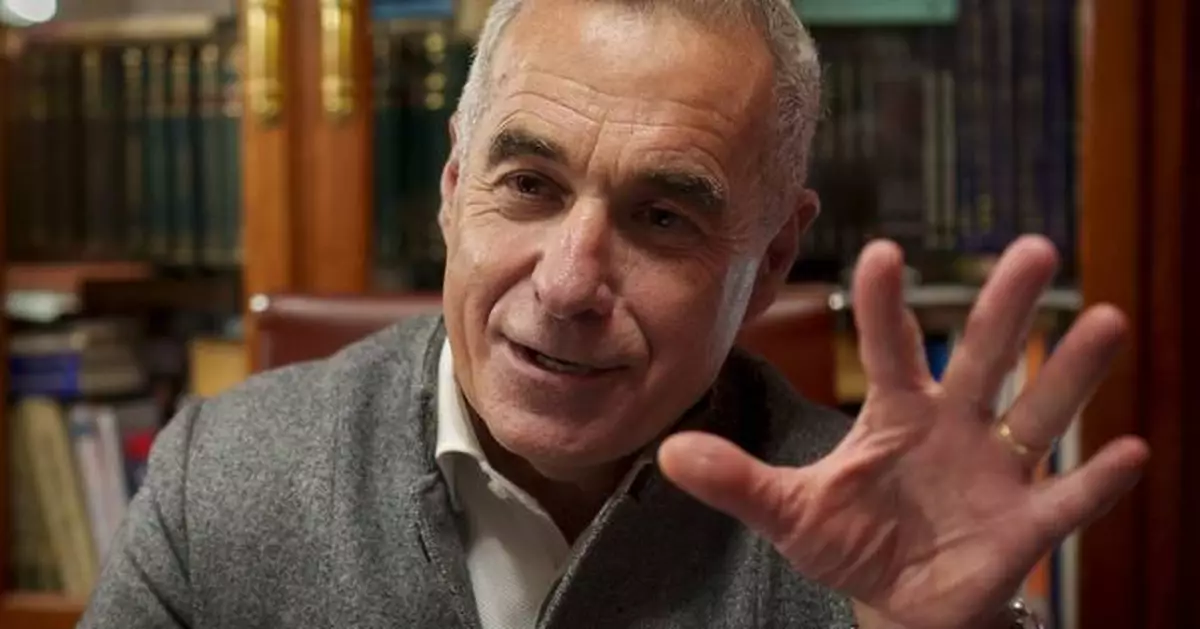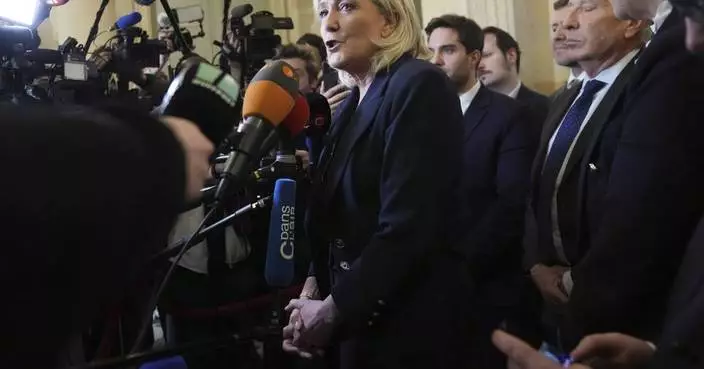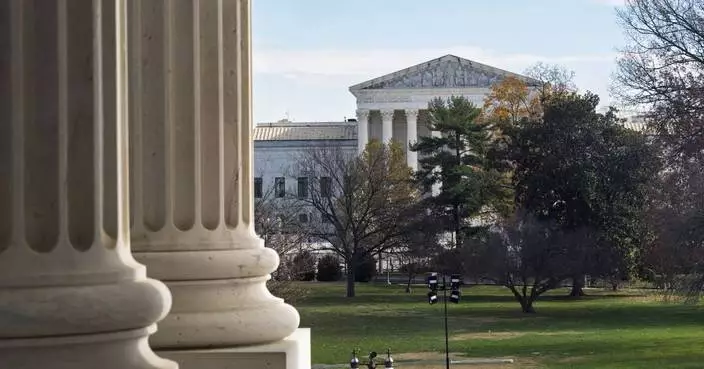IZVORANI, Romania (AP) — The surprise front-runner in Romania’s presidential election insisted to The Associated Press in an interview Wednesday that he is not pro-Russian — hours before Romania declassified intelligence alleging Moscow ran an online campaign to promote him to voters.
Far-right populist Calin Georgescu could not immediately be reached about the unprecedented intelligence release ordered by President Klaus Iohannis, which alleges a sprawling network of thousands of social media accounts across platforms like TikTok and Telegram that promoted Georgescu content. The intelligence indicated a modus operandi and resources “specific to a state actor.”
Click to Gallery
Calin Georgescu, the independent candidate for presidency who won the first round of presidential elections, speaks after an interview with the Associated Press in Izvorani, Romania, Wednesday, Dec. 4, 2024. (AP Photo/Vadim Ghirda)
Calin Georgescu, the independent candidate for presidency who won the first round of presidential elections, speaks after an interview with the Associated Press in Izvorani, Romania, Wednesday, Dec. 4, 2024. (AP Photo/Vadim Ghirda)
Calin Georgescu, the independent candidate for presidency who won the first round of presidential elections, speaks after an interview with the Associated Press in Izvorani, Romania, Wednesday, Dec. 4, 2024. (AP Photo/Vadim Ghirda)
Calin Georgescu, the independent candidate for presidency who won the first round of presidential elections, speaks after an interview with the Associated Press in Izvorani, Romania, Wednesday, Dec. 4, 2024. (AP Photo/Vadim Ghirda)
Calin Georgescu, the independent candidate for presidency who won the first round of presidential elections, speaks after an interview with the Associated Press in Izvorani, Romania, Wednesday, Dec. 4, 2024. (AP Photo/Vadim Ghirda)
Calin Georgescu, the independent candidate for presidency who won the first round of presidential elections, speaks after an interview with the Associated Press in Izvorani, Romania, Wednesday, Dec. 4, 2024. (AP Photo/Vadim Ghirda)
“Romania is a target for aggressive Russian hybrid actions, including cyber attacks and information leaks … and sabotage,” a document from the Foreign Intelligence Service says. It was not immediately clear from the intelligence release whether Georgescu was aware of the alleged campaign or assisted in it.
Sitting at his desk in an isolated compound north of Bucharest earlier Wednesday, Georgescu told the AP that “I am interested in us being a sovereign and self-sufficient power. Freedom and independence come from the ability to finance yourself, not from being financed by others.”
He said Romania’s Western alliances remain secure providing they “serve the sovereignty of the country and nothing else.”
But his success has left Western allies on edge. In the past, Georgescu — who declared zero campaign spending — praised Russian President Vladimir Putin as “a man who loves his country” and called Ukraine “an invented state.” Still, he claims not to be pro-Russian.
Georgescu unexpectedly topped the polls in the first round of the Romanian presidential vote on Nov. 24 despite being a huge outsider, plunging the European Union and NATO country into unprecedented turmoil. On Sunday, he will face reformist Elena Lasconi of the Save Romania Union party in a final vote.
His vision lies in Romania-first policies in a push to become self-reliant in areas such as energy, food, and water. Other key issues he wants to address if he wins the presidency include tackling high poverty rates, organized crime and drug use in schools.
Georgescu is also a self-professed Donald Trump supporter and said the incoming U.S. president “knows what he wants, he loves his people, he put America first, just like I put Romania first ... we have the same ideology.”
Georgescu has courted controversy for describing Romanian fascist and nationalist leaders from the 1930s and 1940s as national heroes. He denies having any connection to extremist organizations and says the quotes were misrepresented.
“I am only for God and my country,” he said. “Period.”
Once a member of Romania’s far-right Alliance for the Unity of Romanians, Georgescu left the party in 2022 after being accused by colleagues of being Russia-friendly and critical of NATO.
Romania has played a key role in the U.S.-led military alliance since Russia fully invaded neighboring Ukraine nearly three years ago. Observers wonder how a Georgescu presidency could affect NATO unity.
“NATO is a defensive organization, but as long as it remains defensive, everything is fine,” the presidential hopeful said. “We will evaluate and see what is to Romania’s advantage … Everything, no matter what, must benefit the Romanian people," referring to two NATO bases in Romania.
On the war in Ukraine, “it’s a very difficult and grave situation," he said. "And my main position is a strategy of peace. Peace with everyone, regardless of who they are.”
But Lasconi, his opponent in Sunday’s runoff, has cast Georgescu as a threat to democracy and national security who is not fit for high office.
“Let us be very clear, Calin Georgescu is an open admirer of Vladimir Putin. He is openly against NATO and the European Union,” she said a day after the first vote. She added that "without NATO we are at the mercy of Russia.”
Georgescu's past controversial remarks are wide-ranging and include questioning vaccine safety, calling climate change a “business scam" and saying “feminism is an absolute mess.”
Georgescu holds a doctorate in pedology, a branch of soil science, and held different positions in Romania’s environment ministry in the 1990s — as well as black belts in judo and karate. Between 1999 and 2012, he was a representative for Romania on the national committee of the United Nations Environment Program.
But he remained a little-known entity until just weeks ago.
Many observers attributed his success to his TikTok account, which now has 5.8 million likes and 531,000 followers. But some experts suspect Georgescu’s online following was artificially inflated while Romania’s top security body alleged he was given preferential treatment by TikTok over other candidates.
In Romania's intelligence release hours after Georgescu's AP interview, the secret services alleged that one TikTok user paid more $381,000 (361,000 euros) to other users to promote Georgescu content. Intelligence authorities said information it obtained “revealed an aggressive promotion campaign” to increase and accelerate his popularity.
Asked by the AP whether he believes the Chinese-owned TikTok can pose a threat to democracy, Georgescu said: “The most important existing function for promoting free speech and freedom of expression is social media.”
He added that Romania’s political class has “constantly shown an inferiority complex” toward the West and vowed to change the dynamic.
“Everything I do and will do will be from a negotiation standpoint, in the sense that Romania will stand tall and not on its knees,” he said.
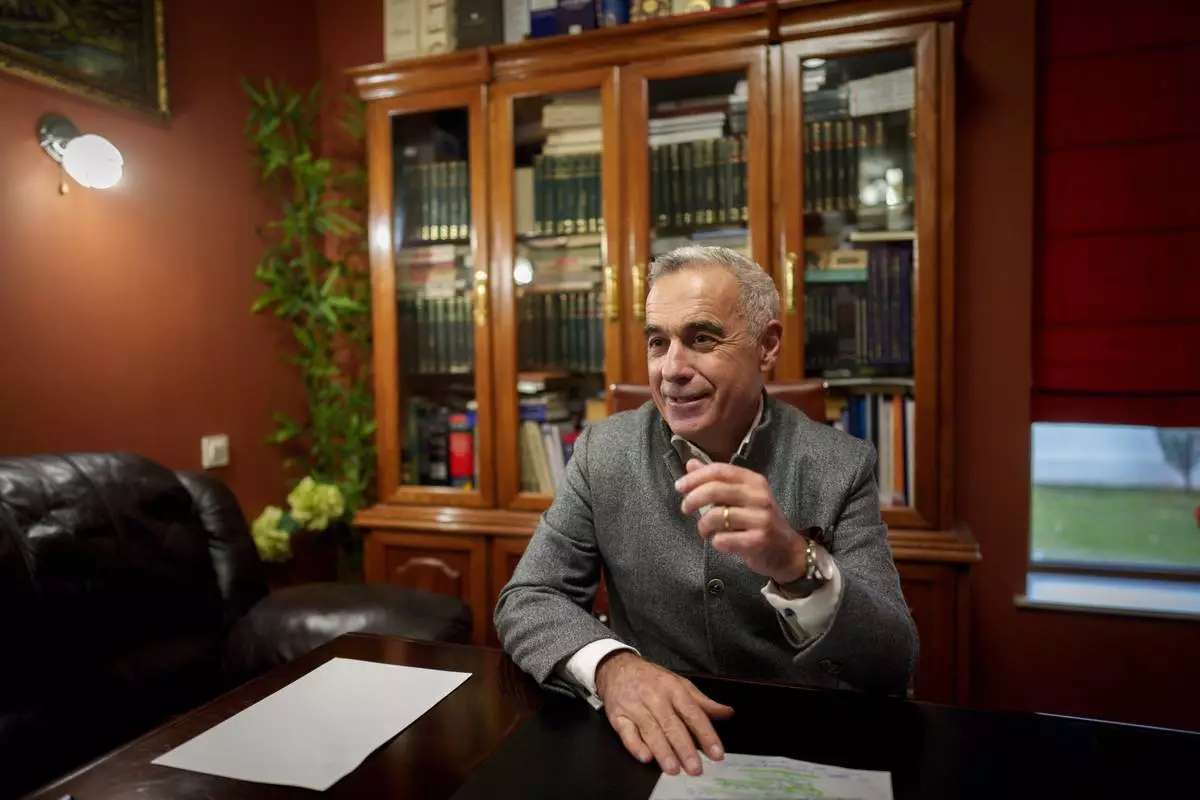
Calin Georgescu, the independent candidate for presidency who won the first round of presidential elections, speaks after an interview with the Associated Press in Izvorani, Romania, Wednesday, Dec. 4, 2024. (AP Photo/Vadim Ghirda)
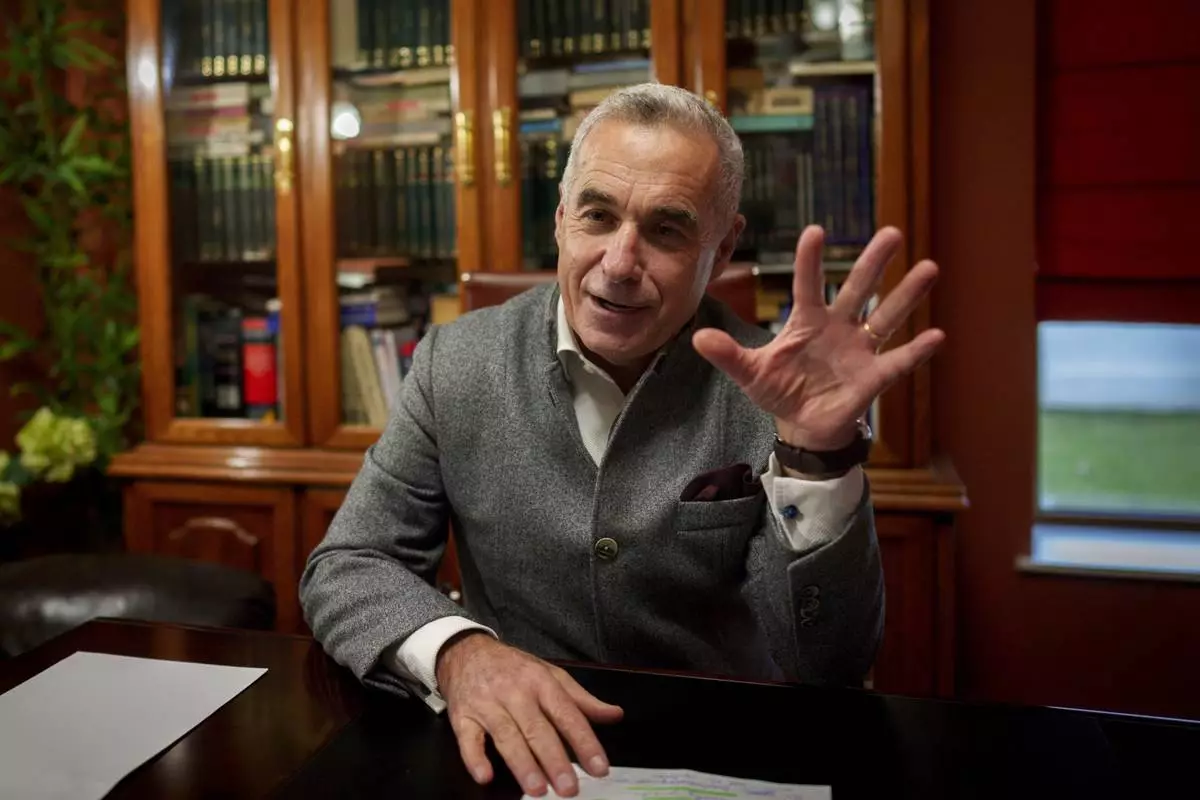
Calin Georgescu, the independent candidate for presidency who won the first round of presidential elections, speaks after an interview with the Associated Press in Izvorani, Romania, Wednesday, Dec. 4, 2024. (AP Photo/Vadim Ghirda)
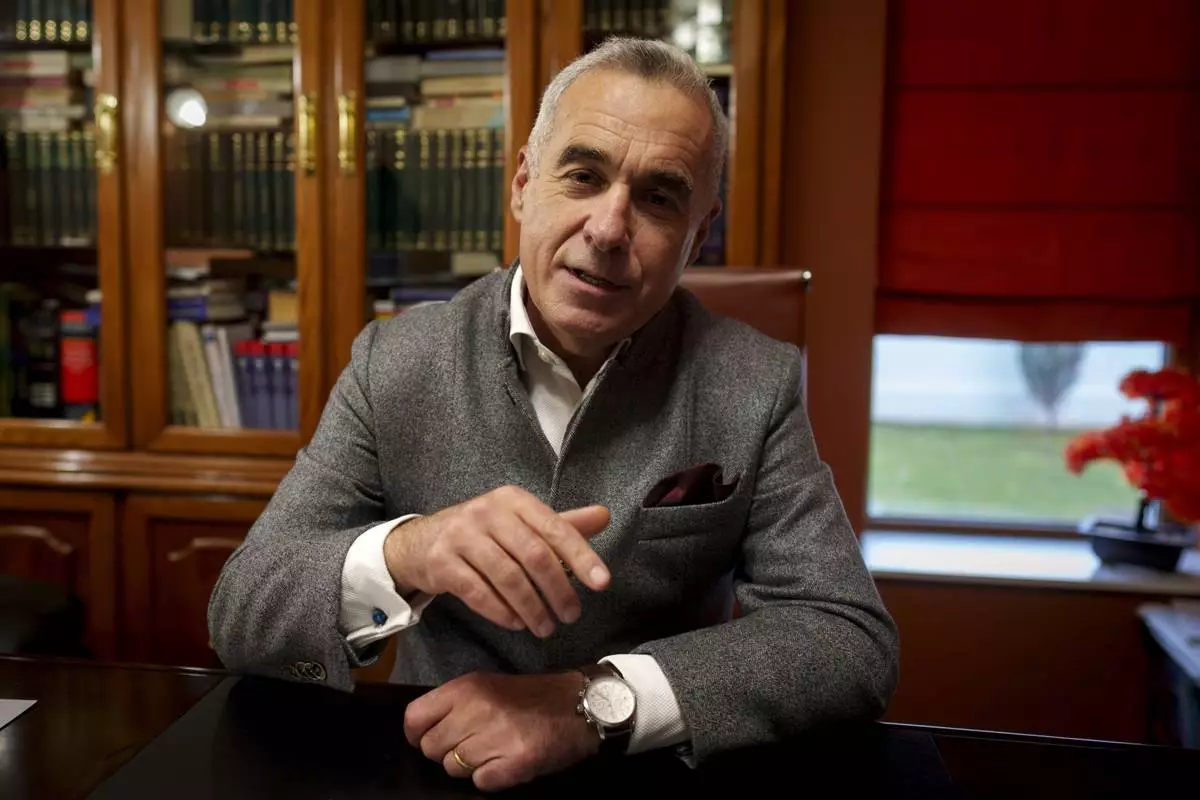
Calin Georgescu, the independent candidate for presidency who won the first round of presidential elections, speaks after an interview with the Associated Press in Izvorani, Romania, Wednesday, Dec. 4, 2024. (AP Photo/Vadim Ghirda)
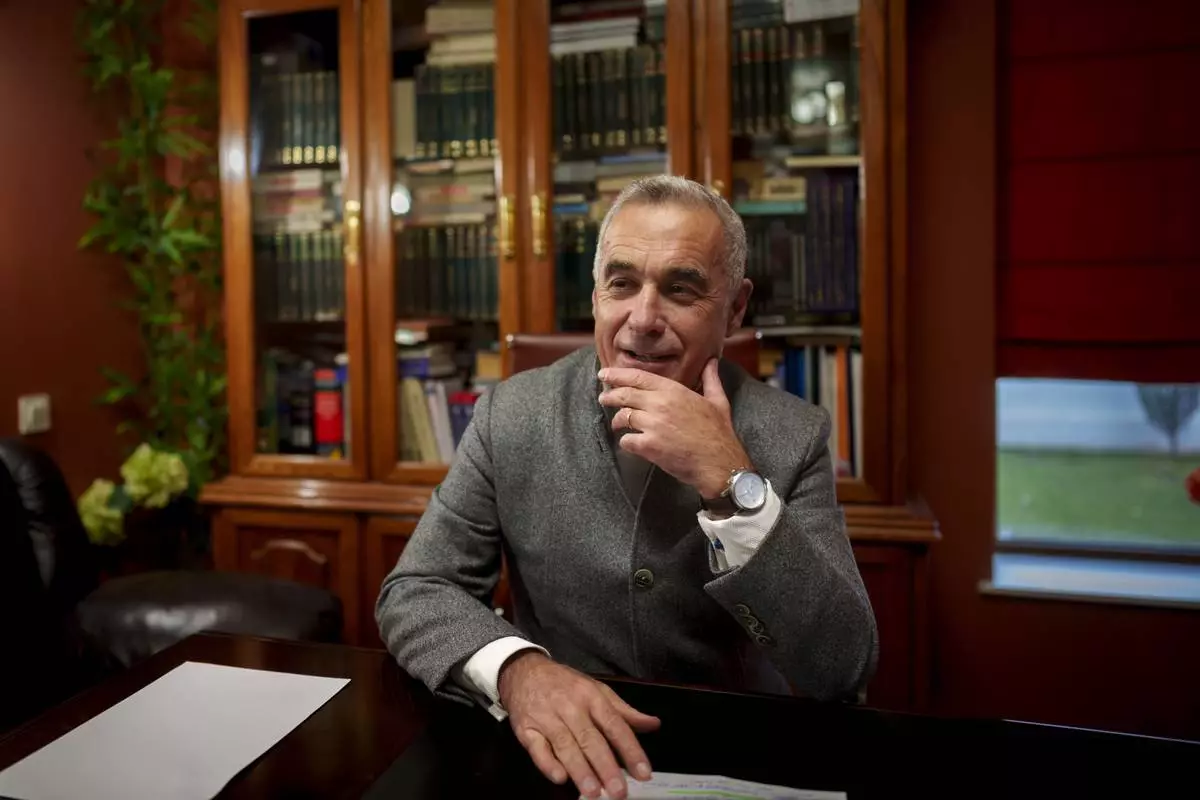
Calin Georgescu, the independent candidate for presidency who won the first round of presidential elections, speaks after an interview with the Associated Press in Izvorani, Romania, Wednesday, Dec. 4, 2024. (AP Photo/Vadim Ghirda)
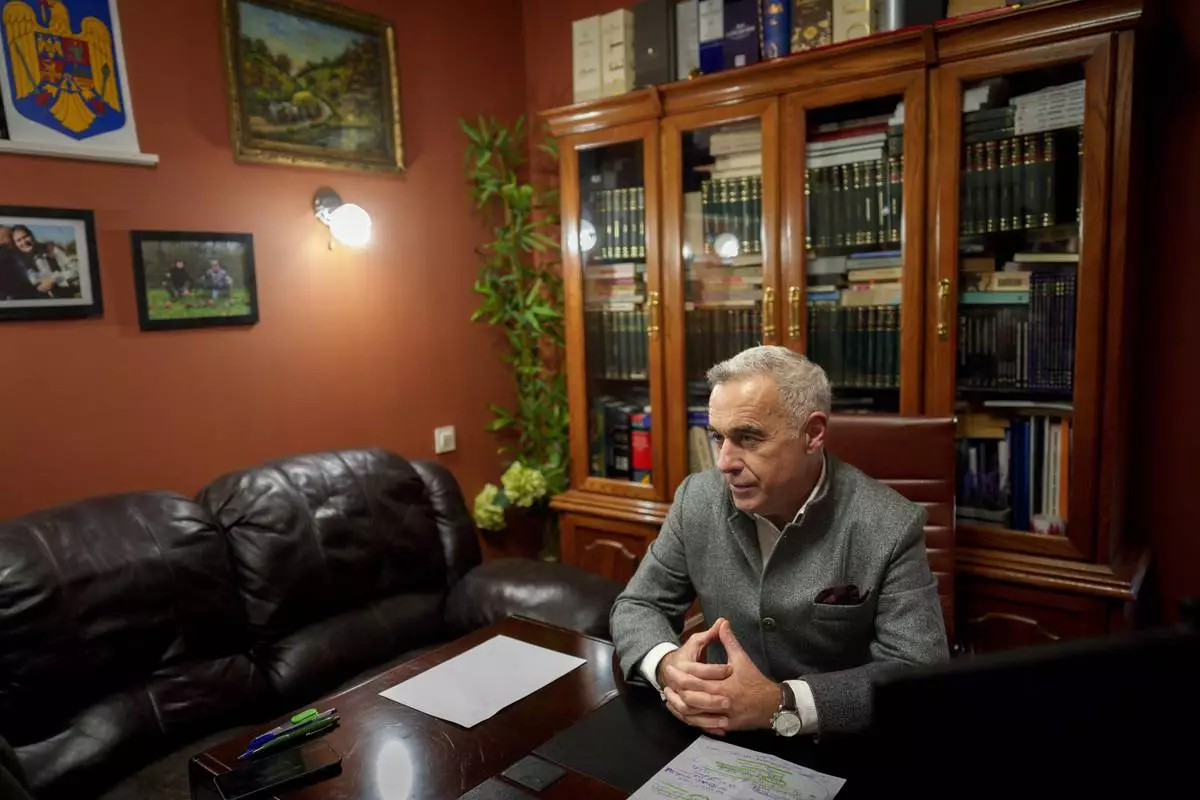
Calin Georgescu, the independent candidate for presidency who won the first round of presidential elections, speaks after an interview with the Associated Press in Izvorani, Romania, Wednesday, Dec. 4, 2024. (AP Photo/Vadim Ghirda)
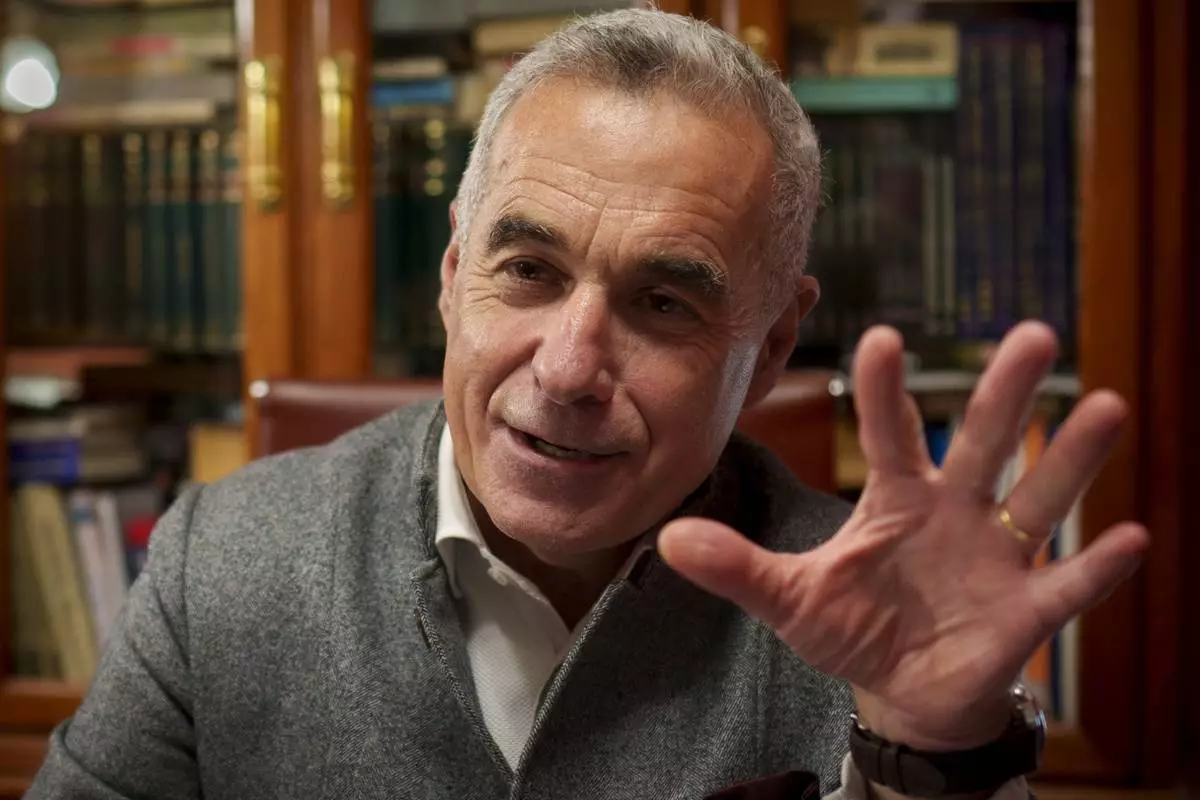
Calin Georgescu, the independent candidate for presidency who won the first round of presidential elections, speaks after an interview with the Associated Press in Izvorani, Romania, Wednesday, Dec. 4, 2024. (AP Photo/Vadim Ghirda)
PARIS (AP) — France’s far-right and left-wing lawmakers joined together to vote Wednesday a no-confidence motion prompted by budget disputes that forces Prime Minister Michel Barnier to resign.
The National Assembly approved the motion by 331 votes. A minimum of 288 were needed.
President Emmanuel Macron insisted he will serve the rest of his term until 2027. However, he will need to appoint a new prime minister for the second time after July’s legislative elections led to a deeply divided parliament.
THIS IS A BREAKING NEWS UPDATE. AP’s earlier story follows below.
PARIS (AP) — France’s far-right and left-wing forces are expected to join together Wednesday to oust Prime Minister Michel Barnier’s government in a historic no-confidence vote prompted by budget disputes. If the motion succeeds, it would mark the first time a French government has been toppled this way in more than 60 years.
President Emmanuel Macron insisted he will serve the rest of his term until 2027 despite growing opposition calls for his departure amid the turmoil. However, Macron will need to appoint a new prime minister for the second time after his party’s losses in July’s legislative elections.
Macron, on his way back from a presidential visit to Saudi Arabia, said discussions about him potentially resigning were “make-believe politics," according to French media reports.
“I’m here because I’ve been elected twice by the French people,” Macron said. He was also reported as saying: “We must not scare people with such things. We have a strong economy."
The no-confidence motion rose from fierce opposition to Barnier’s proposed budget.
The National Assembly, France’s lower house of parliament, is deeply fractured, with no single party holding a majority. It comprises three major blocs: Macron’s centrist allies, the left-wing coalition New Popular Front, and the far-right National Rally. Both opposition blocs, typically at odds, are uniting against Barnier, accusing him of imposing austerity measures and failing to address citizens’ needs.
Barnier, a conservative appointed in September, could become the country's shortest-serving prime minister in France's modern Republic.
In last-minute efforts to try to save his government, Barnier called on lawmakers to act with “responsibility” and think of “the country's best interest."
“The situation is very difficult economically, socially, fiscally and financially," he said, speaking on national television TF1 and France 2 on Tuesday evening. "If the no-confidence motion passes, everything will be more difficult and everything will be more serious.”
Speaking at the National Assembly ahead of the vote, National Rally leader Marine Le Pen, whose party's goodwill was crucial to keeping Barnier in power, said “we’ve reached the moment of truth, a parliamentary moment unseen since 1962, which will likely seal the end of a short-lived government.”
“Stop pretending the lights will go out,” hard-left lawmaker Eric Coquerel said, noting the possibility of an emergency law to levy taxes from Jan. 1, based on this year’s rules. “The special law will prevent a shutdown. It will allow us to get through the end of the year by delaying the budget by a few weeks.”
The National Assembly said the no-confidence motion requires at least 288 of 574 votes to pass. The left and the far right count over 330 lawmakers — yet some may abstain from voting.
If Barnier’s government falls, Macron must appoint a new prime minister, but the fragmented parliament remains unchanged. No new legislative elections can be held until at least July, creating a potential stalemate for policymakers.
While France is not at risk of a U.S.-style government shutdown, political instability could spook financial markets.
France is under pressure from the European Union to reduce its colossal debt. The country’s deficit is estimated to reach 6% of gross domestic product this year and analysts say it could rise to 7% next year without drastic adjustments. The political instability could push up French interest rates, digging the debt even further.
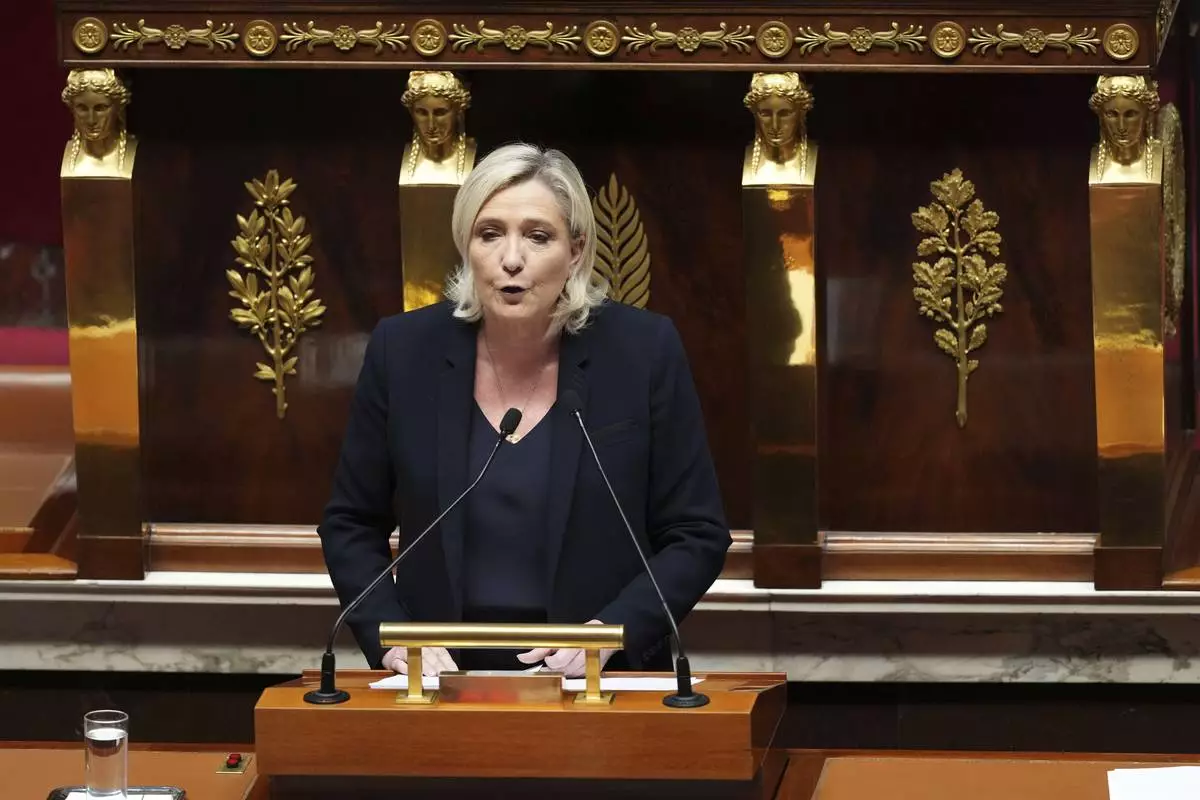
French far-right leader Marine Le Pen speaks at the National Assembly prior to a no-confidence vote that could bring down the Prime Minister and the government for the first time since 1962, Wednesday, Dec. 4, 2024 in Paris. (AP Photo/Michel Euler)
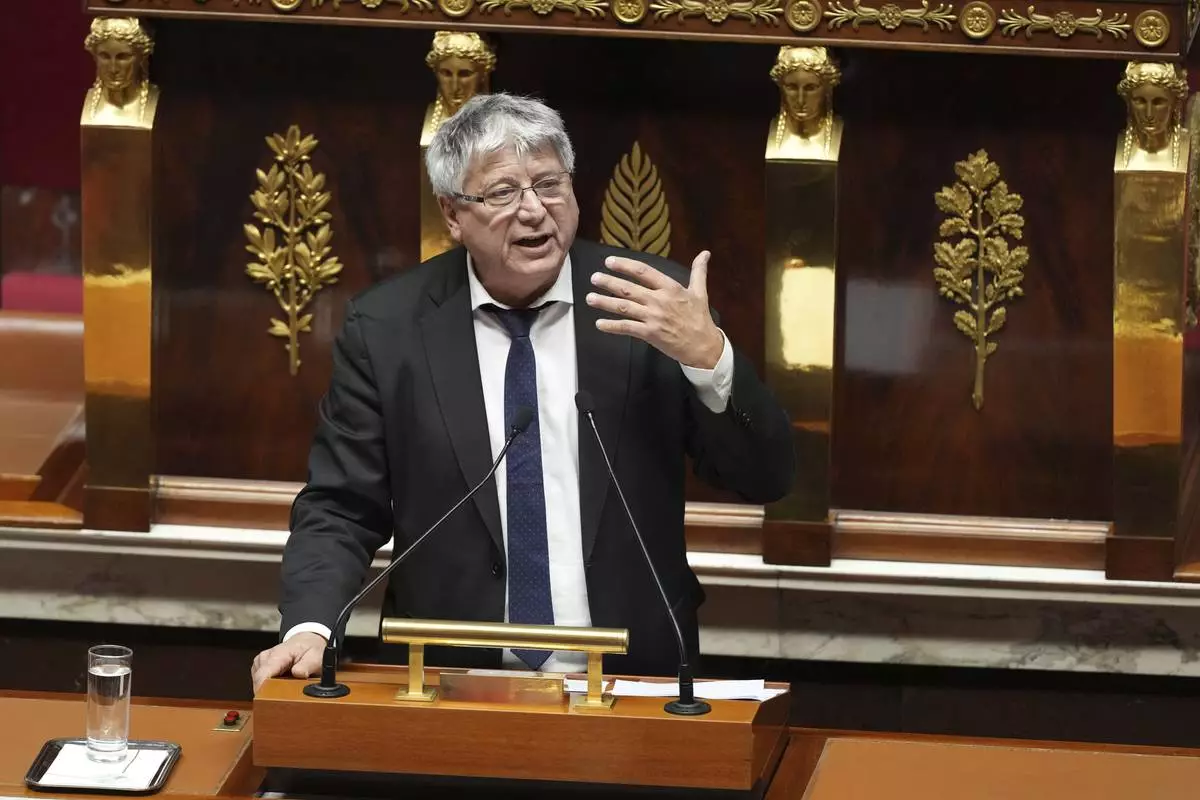
French far-left France Unbowed party parliament member Eric Coquerel speaks at the National Assembly prior to a no-confidence vote that could bring down the Prime Minister and the government for the first time since 1962, Wednesday, Dec. 4, 2024 in Paris. (AP Photo/Michel Euler)
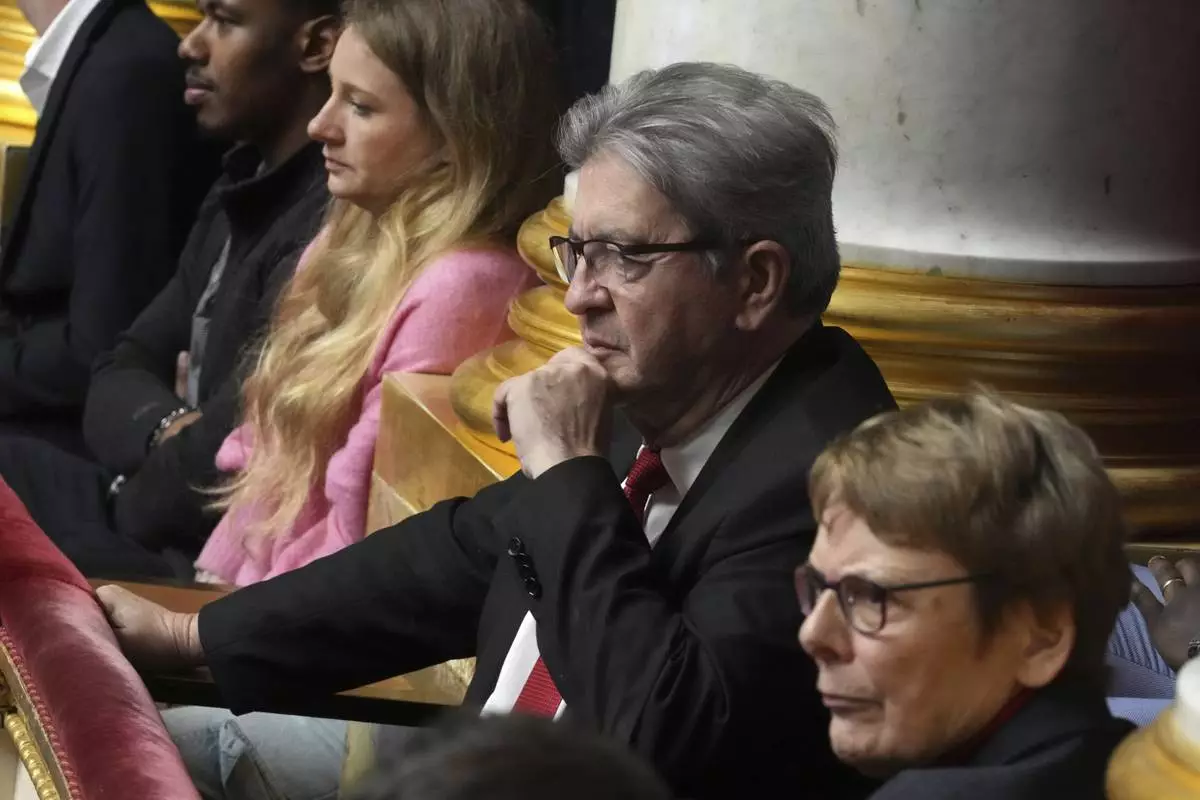
French far-left leader Jean-Luc Melenchon listens to speeches rom the tribunes at the National Assembly prior to a no-confidence vote that could bring down the Prime Minister and the government for the first time since 1962, Wednesday, Dec. 4, 2024 in Paris. (AP Photo/Michel Euler)
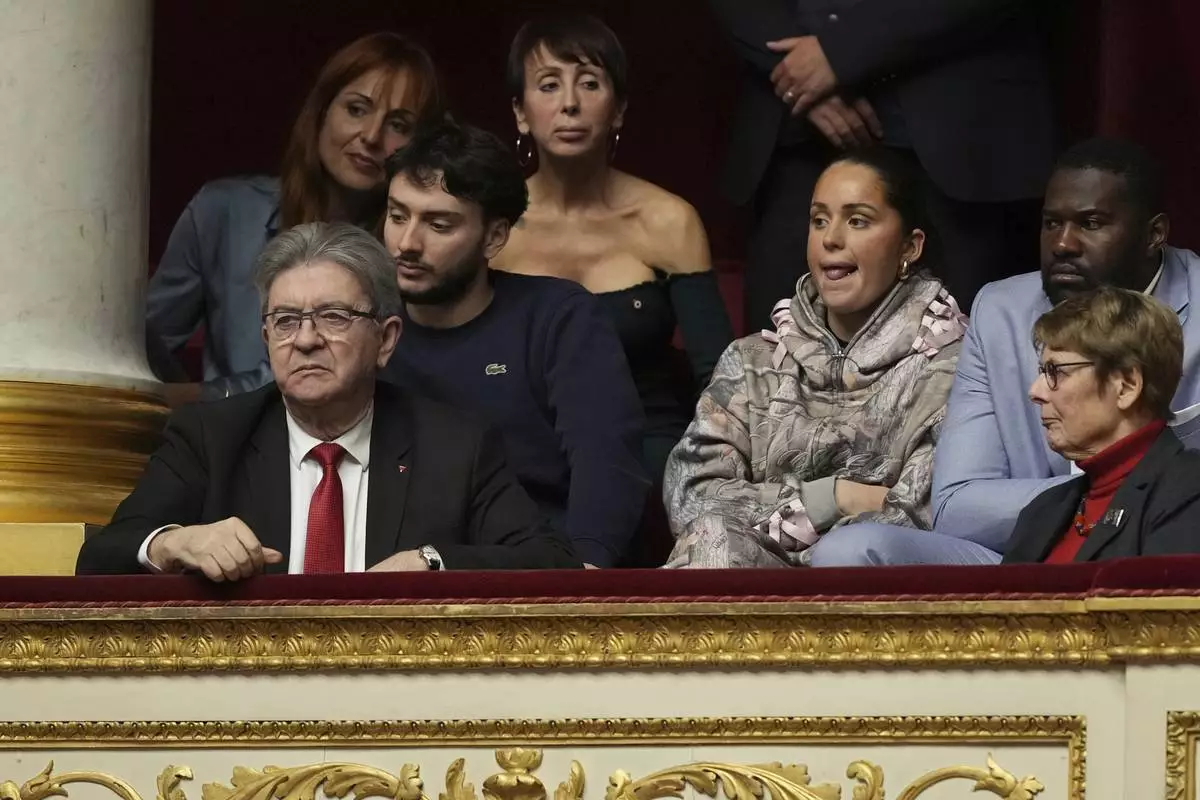
French far-left leader Jean-Luc Melenchon, left, listens to speeches from the tribunes at the National Assembly prior to a no-confidence vote that could bring down the Prime Minister and the government for the first time since 1962, Wednesday, Dec. 4, 2024 in Paris. (AP Photo/Michel Euler)
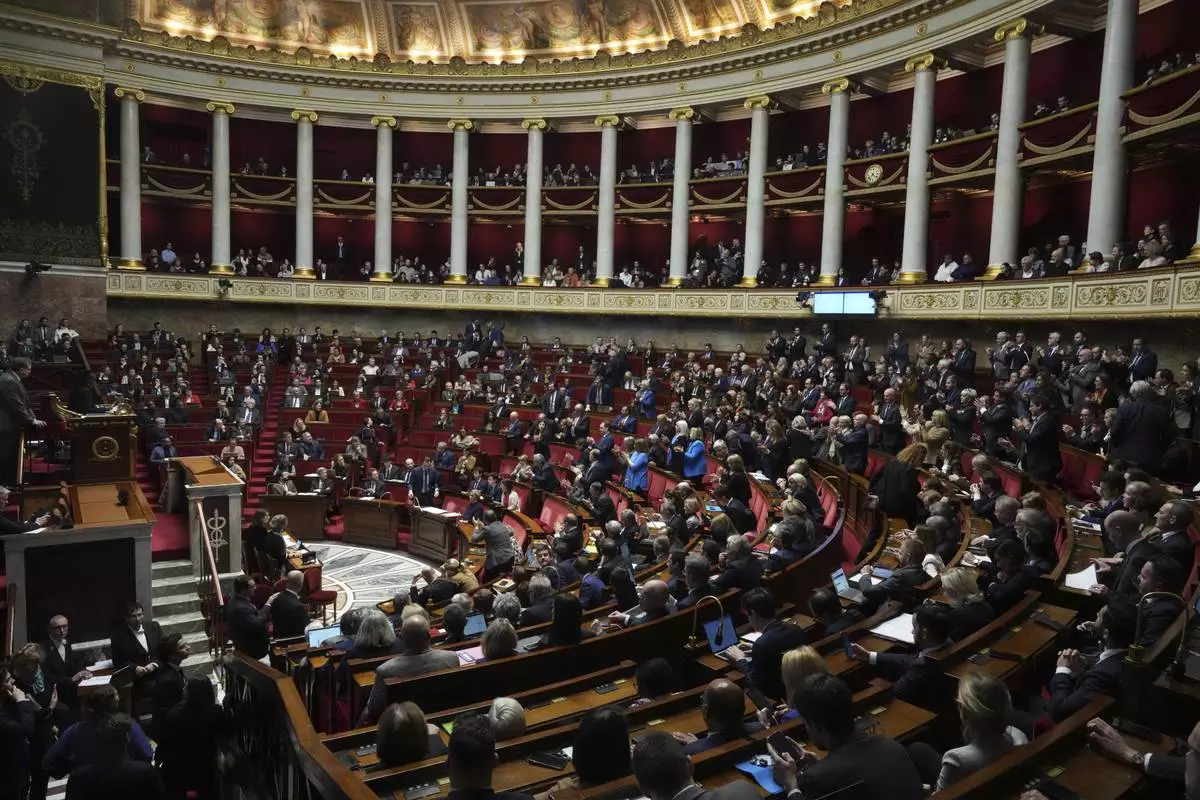
Lawmakers convene at the National Assembly during a debate and prior to a no-confidence vote that could bring down the Prime Minister and the government for the first time since 1962, Wednesday, Dec. 4, 2024 in Paris. (AP Photo/Michel Euler)
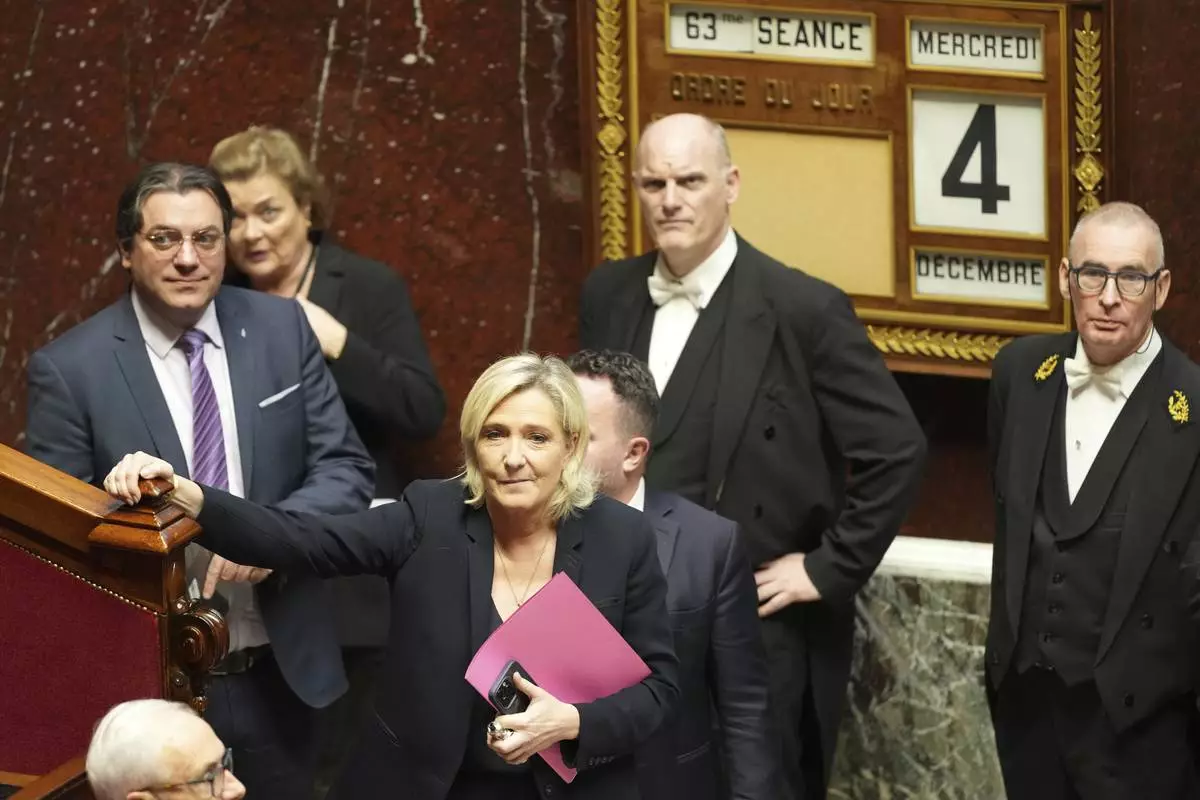
French far-right leader Marine Le Pen arrives to deliver her speech at the National Assembly prior to a no-confidence vote that could bring down the Prime Minister and the government for the first time since 1962, Wednesday, Dec. 4, 2024 in Paris. (AP Photo/Michel Euler)
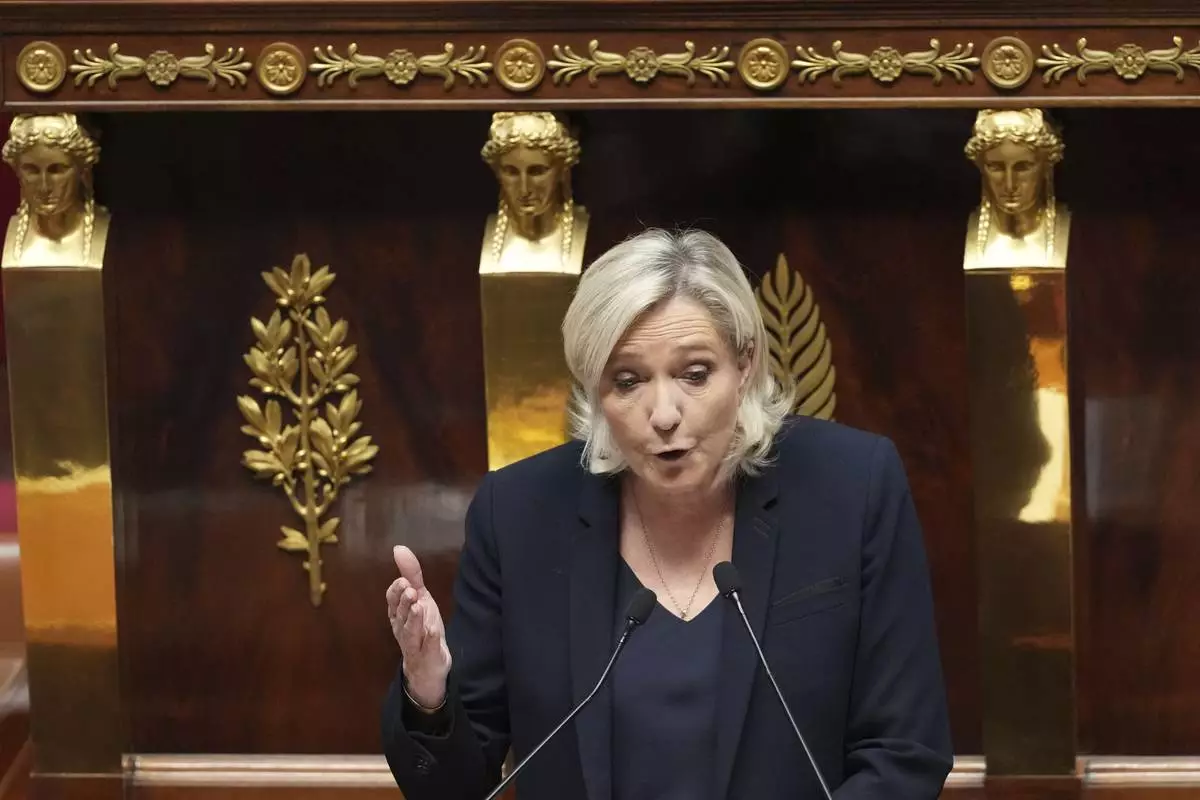
French far-right leader Marine Le Pen delivers her speech at the National Assembly prior to a no-confidence vote that could bring down the Prime Minister and the government for the first time since 1962, Wednesday, Dec. 4, 2024 in Paris. (AP Photo/Michel Euler)
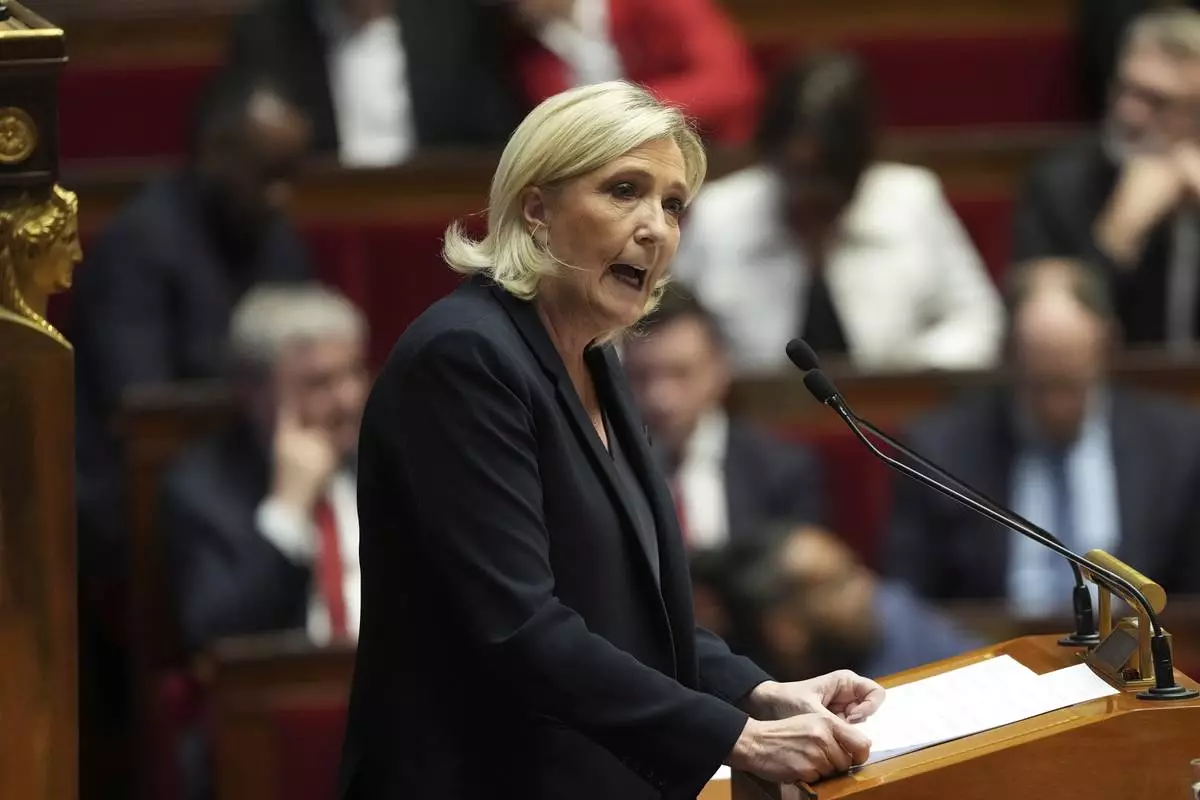
French far-right leader Marine Le Pen delivers her speech at the National Assembly prior to a no-confidence vote that could bring down the Prime Minister and the government for the first time since 1962, Wednesday, Dec. 4, 2024 in Paris. (AP Photo/Michel Euler)
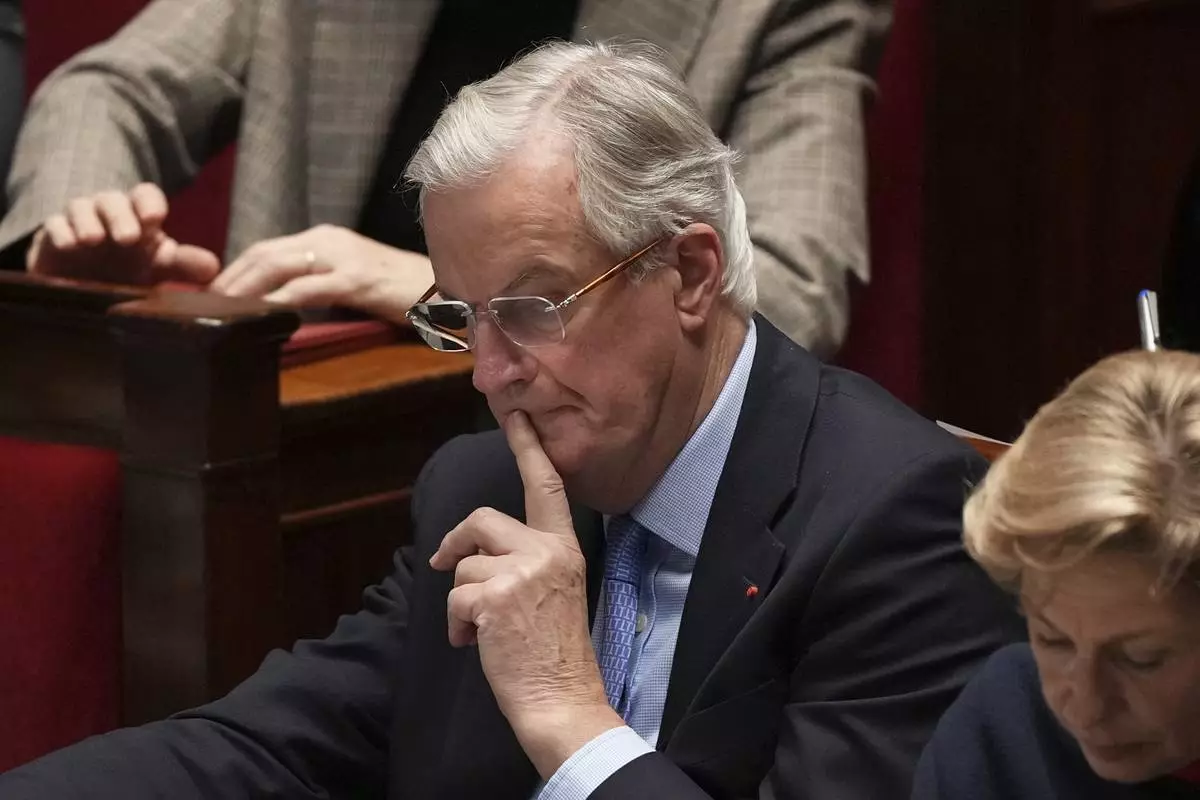
French Prime Minister Michel Barnier listens to speeches at the National Assembly prior to a no-confidence vote that could bring down the Prime Minister and the government for the first time since 1962, Wednesday, Dec. 4, 2024 in Paris. (AP Photo/Michel Euler)
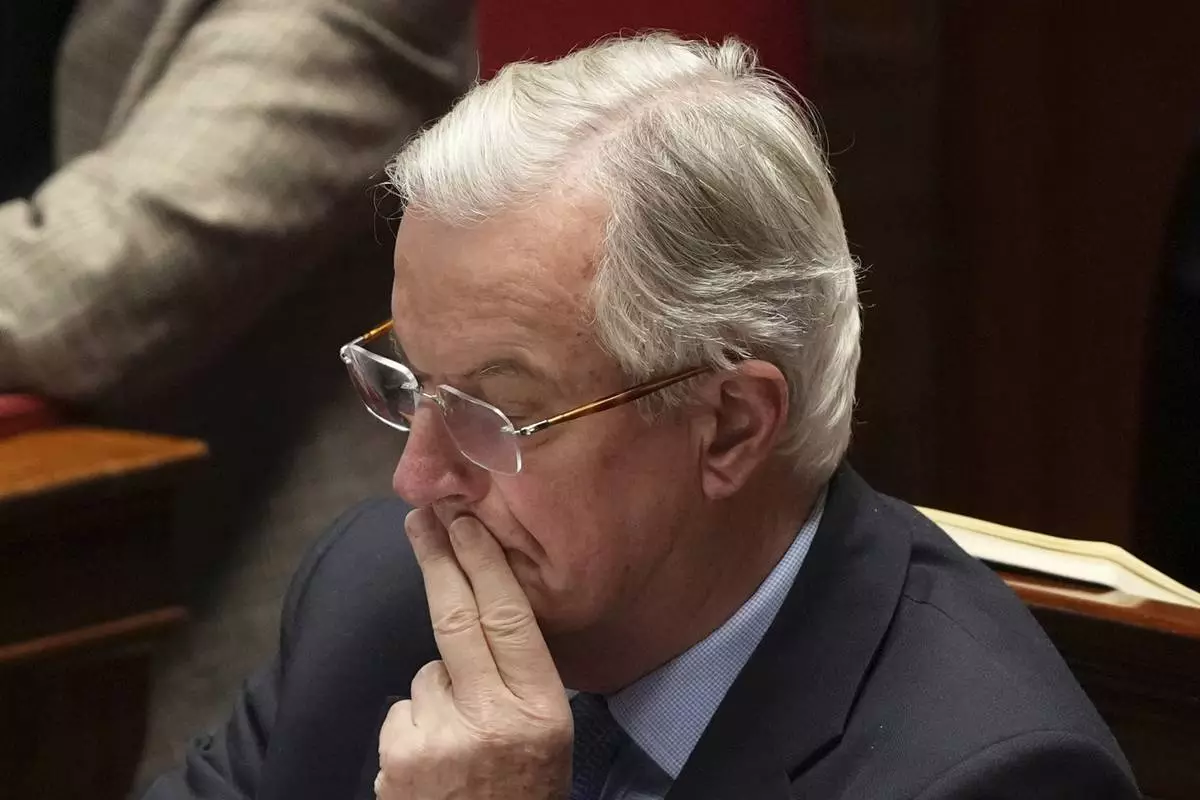
French Prime Minister Michel Barnier listens to speeches at the National Assembly prior to a no-confidence vote that could bring down the Prime Minister and the government for the first time since 1962, Wednesday, Dec. 4, 2024 in Paris. (AP Photo/Michel Euler)
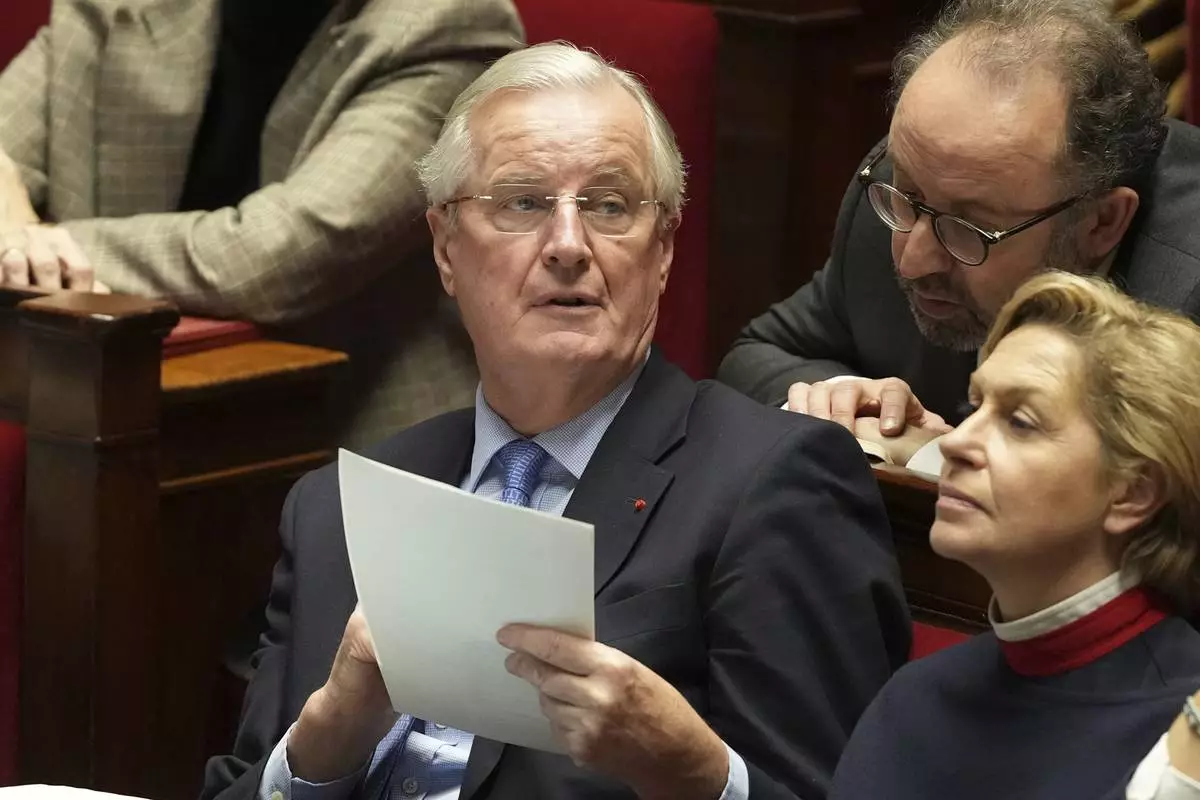
French Prime Minister Michel Barnier holds a document during speeches at the National Assembly prior to a no-confidence vote that could bring down the Prime Minister and the government for the first time since 1962, Wednesday, Dec. 4, 2024 in Paris. (AP Photo/Michel Euler)
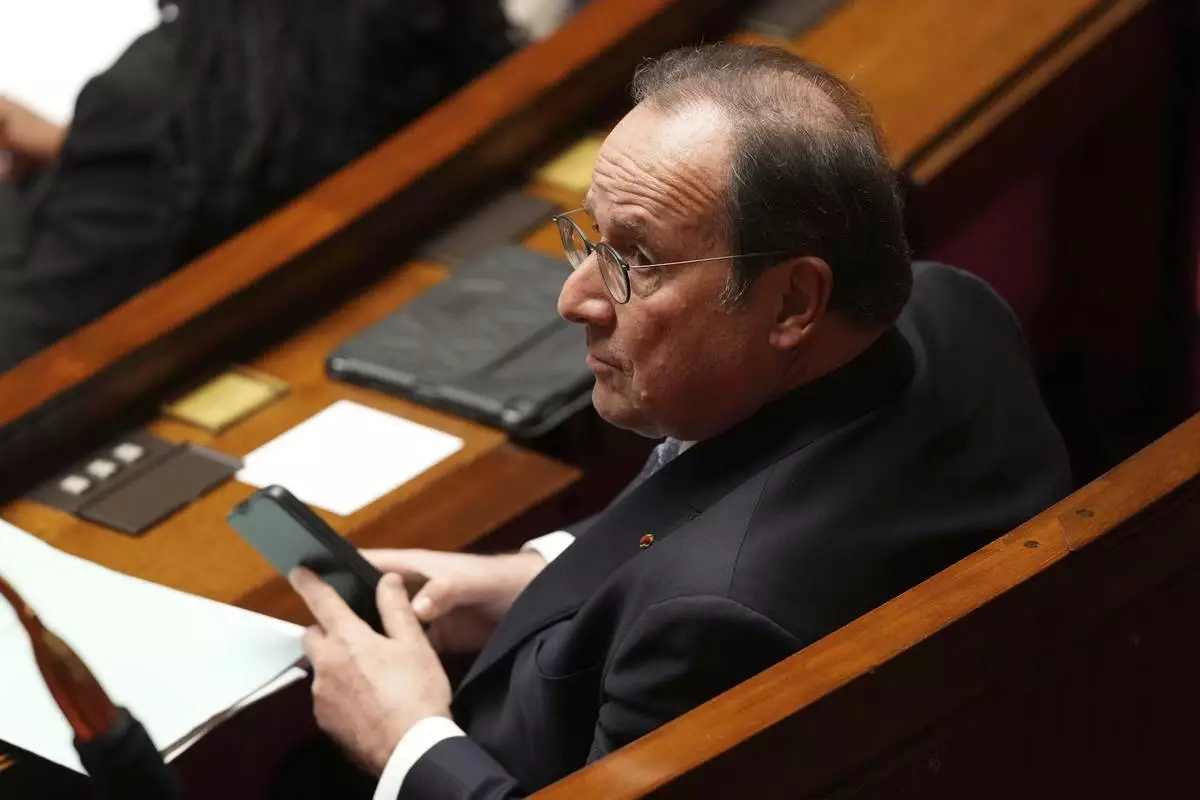
Former French President and now socialist party parliament member Francois Hollande sits at the National Assembly before French lawmakers vote on a no-confidence motion that could bring down the Prime Minister and the government for the first time since 1962, Wednesday, Dec. 4, 2024 in Paris. (AP Photo/Michel Euler)
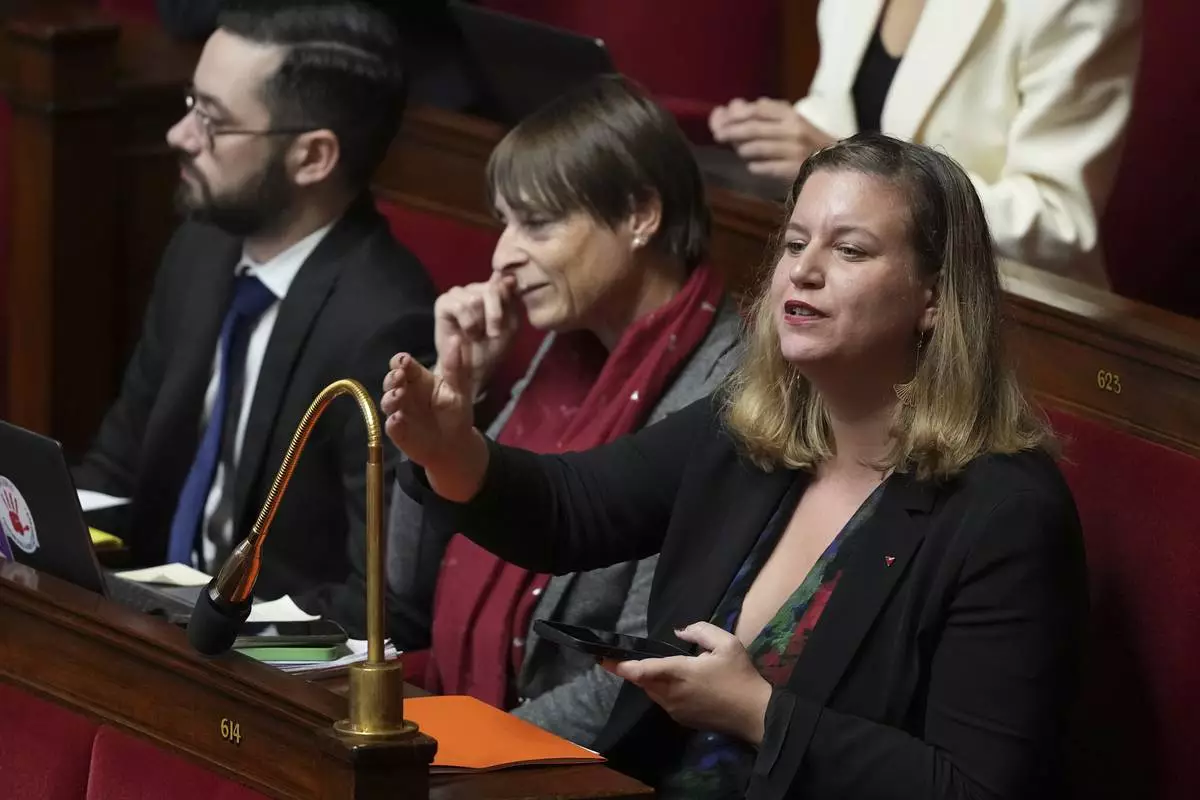
French far-left France Unbowed party parliament group president Mathilde Panot, right, gestures at the National Assembly before French lawmakers vote on a no-confidence motion that could bring down the Prime Minister and the government for the first time since 1962, Wednesday, Dec. 4, 2024 in Paris. (AP Photo/Michel Euler)
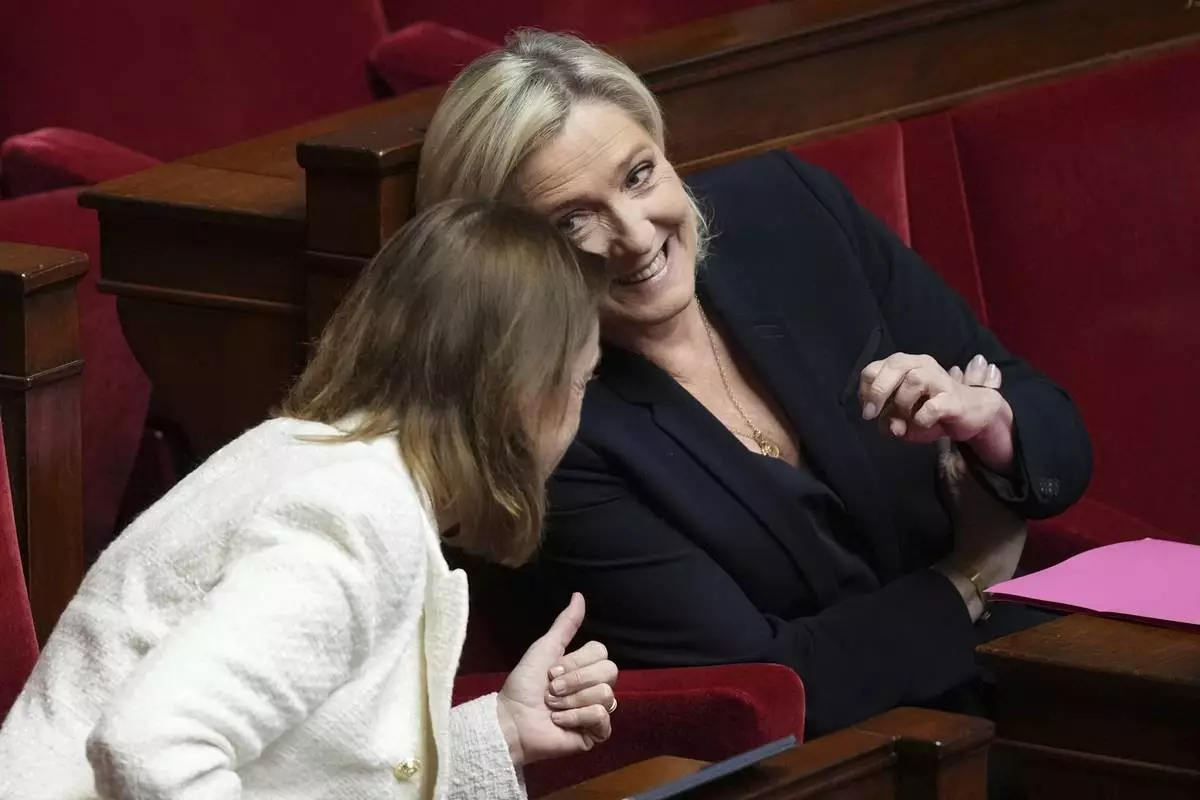
French far-right leader Marine Le Pen, right, talks with a National Rally parliament member at the National Assembly before French lawmakers vote on a no-confidence motion that could bring down the Prime Minister and the government for the first time since 1962, Wednesday, Dec. 4, 2024 in Paris. (AP Photo/Michel Euler)
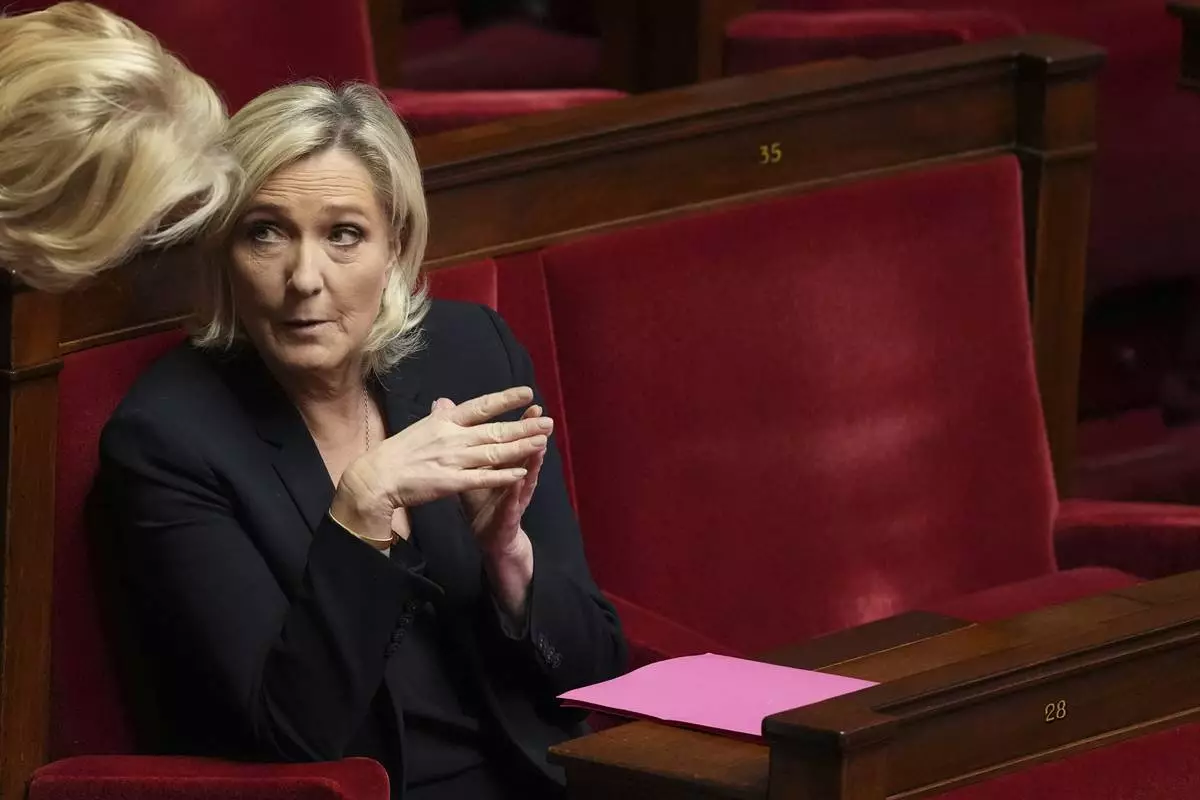
French far-right leader Marine Le Pen sits at the National Assembly before French lawmakers vote on a no-confidence motion that could bring down the Prime Minister and the government for the first time since 1962, Wednesday, Dec. 4, 2024 in Paris. (AP Photo/Michel Euler)
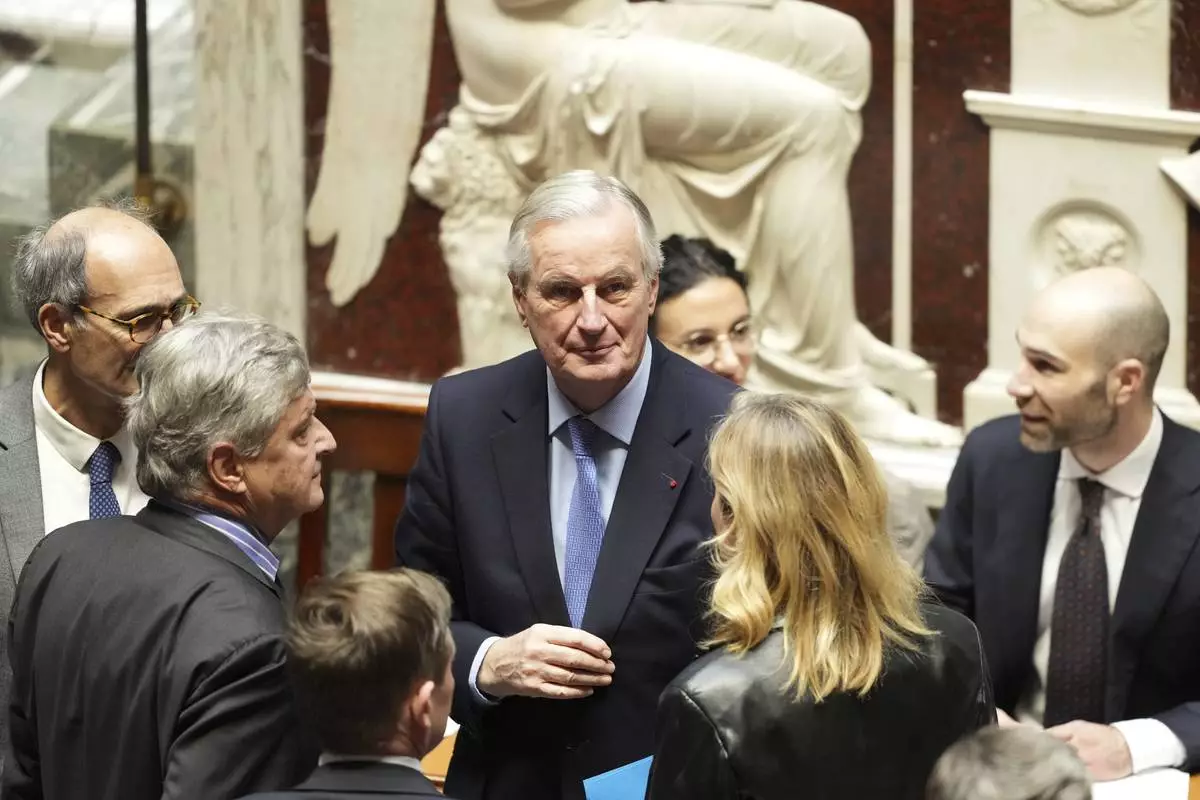
French Prime Minister Michel Barnier, center, talks to people at the National Assembly before French lawmakers vote on a no-confidence motion that could bring down the prime minister and the government for the first time since 1962, Wednesday, Dec. 4, 2024 in Paris. (AP Photo/Michel Euler)
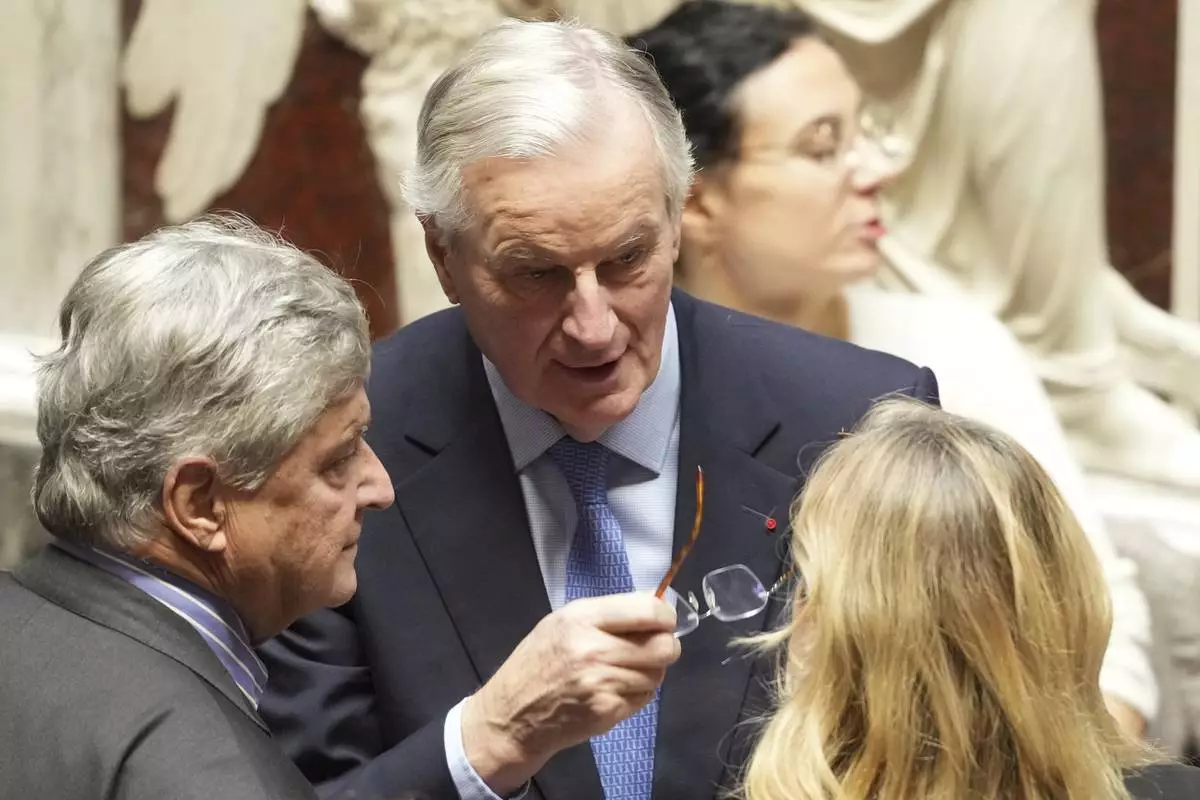
French Prime Minister Michel Barnier, center, talks to people at the National Assembly before French lawmakers vote on a no-confidence motion that could bring down the prime minister and the government for the first time since 1962, Wednesday, Dec. 4, 2024 in Paris. (AP Photo/Michel Euler)








